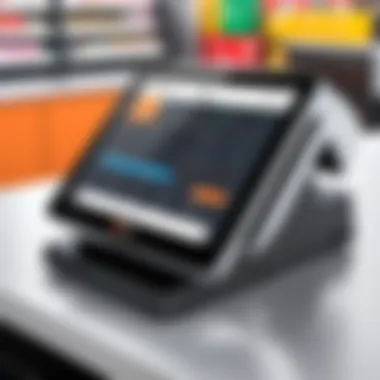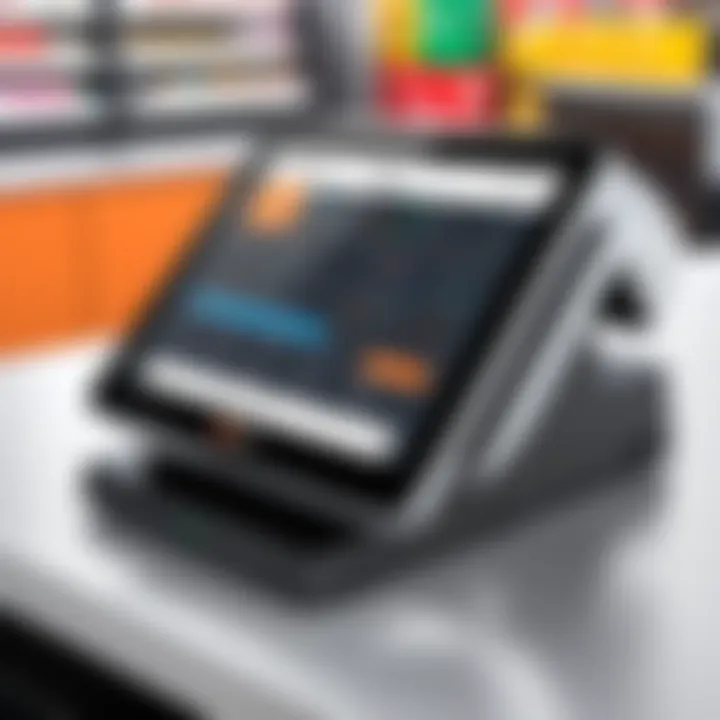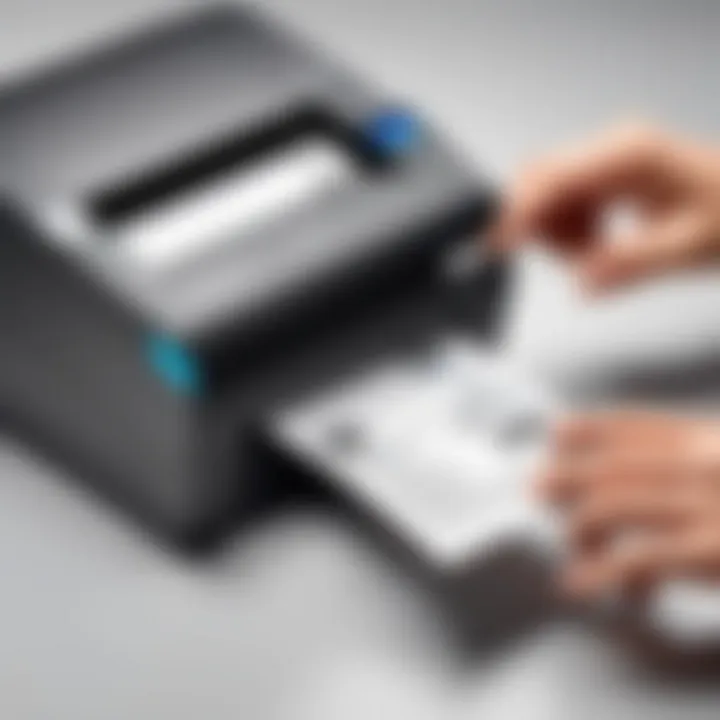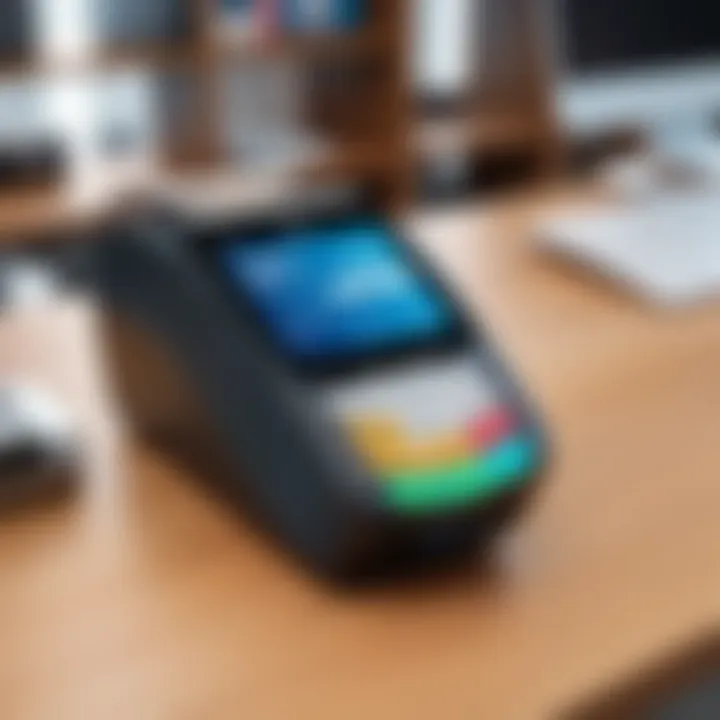Best POS Hardware for Retail: An In-Depth Analysis


Intro
In the ever-evolving landscape of retail, technological advancements have become pivital in maintaining competitiveness. Point of Sale (POS) hardware stands at the forefront of these innovations, shaping the interactions between businesses and customers. Understanding the best POS hardware is essential for retail success. This article aims to provide an exhaustive analysis of various POS hardware solutions tailored to meet the diverse needs of different retail environments.
As businesses seek to optimize their operations, the selection of POS hardware can significantly influence efficiency, customer satisfaction, and overall profitability. This article delves into the core features of POS systems, addresses pricing structures, and evaluates options based on size and budget. Stakeholders will find relevant insights to streamline their purchasing processes and ensure they choose hardware that aligns with their objectives.
Key Features
Understanding the key features of POS hardware is critical for decision-makers in retail sectors. Businesses must evaluate these components to make informed selections that meet their operational needs.
Overview of Core Features
POS hardware typically integrates multiple components that work together seamlessly. The main elements include:
- POS Terminal: This is the computing device where transactions occur. It may include touch screens for user-friendly navigation and speed.
- Barcode Scanner: Essential for processing sales efficiently, this device reads product codes to streamline checkout and inventory management.
- Receipt Printer: Ensures customers receive proof of purchase. Different models offer various printing speeds and styles.
- Cash Drawer: A secure place to manage cash transactions, which is still relevant despite the rise in digital payment methods.
- Payment Processing Hardware: This includes card readers that support various payment types, including contactless payments, enhancing customer convenience.
Each of these core components plays a vital role in the overall functionality of a POS system.
User Interface and Experience
The user interface of a POS system directly affects how efficiently employees can operate the hardware. An intuitive design can minimize training time for staff and reduce errors during transactions. Features to consider in this area include:
- Customizable Dashboards: Allowing users to access essential functions quickly can improve operational speed.
- Multilingual Support: Important for businesses in diverse communities, enabling customer interactions in various languages.
- Mobile Accessibility: Some systems offer mobile POS solutions, allowing transactions to occur anywhere in the store, which caters to enhancing customer service.
The user experience should always prioritize ease of use, as this can directly correlate with sales performance and customer satisfaction.
Pricing and Plans
When selecting POS hardware, pricing is often a determining factor. Businesses must navigate different pricing models and plans, focusing on value and capabilities.
Overview of Pricing Models
Pricing for POS hardware can vary widely based on brand, features, and customization options. Common pricing models include:
- One-time Purchase: Businesses pay upfront for complete hardware.
- Subscription Plan: Monthly payments for using the POS system, often including support and updates.
- Leasing Options: Renting hardware for a set period can prove more manageable for some companies.
This variety offers flexibility, but it's crucial to assess total costs over time.
Comparison of Different Plans
Within the market, multiple options exist offering various benefits. For example:
- Square POS: Offers simplicity and affordability, ideal for small businesses.
- Shopify POS: Tailored for e-commerce retailers needing integration with online sales.
- Clover POS: Known for robust features suitable for medium to larger businesses.
Each system's cost should align with the specific needs and expected growth of the business, ensuring a sound return on investment.
Understanding your specific business needs and budget constraints can significantly assist in choosing the right POS hardware.
Understanding POS Hardware
Understanding Point of Sale (POS) hardware is crucial in today’s retail landscape. It serves as the backbone of retail operations, ensuring transactions are completed smoothly and efficiently. Familiarity with POS hardware helps organizations make informed decisions, maximizing return on investment while enhancing customer experience. Various retailers, from small boutique shops to widespread chains, rely on robust POS systems. Given their importance, delving into the specifics of POS hardware is not just beneficial but essential.
Definition of POS Hardware
POS hardware refers to the physical components that enable sales transactions in retail environments. This can include devices like POS terminals, barcode scanners, receipt printers, cash drawers, and payment processing devices. These elements work together to streamline the checkout process and facilitate inventory management. Simply put, without POS hardware, the retail operation would face significant hurdles in processing sales and managing stock effectively.
Importance in Retail Operations
The role of POS hardware in retail operations cannot be overstated. A reliable POS system improves transaction speed and accuracy, thereby minimizing customer wait times. This effectiveness can lead to higher customer satisfaction and retention rates.
Consider the following benefits of well-integrated POS hardware:
- Efficient Transactions: Allows faster billing for customers, directly impacting sales volume.
- Inventory Management: Enhances control over stock levels, making it easier to track sold items.
- Data Collection: Captures sales data for analysis, assisting businesses in making informed decisions.
- Improved Customer Experience: By reducing the time taken to complete transactions, it fosters a more pleasant shopping atmosphere.
"Investing in quality POS hardware significantly enhances operational efficiency and customer satisfaction."
Key Components of POS Hardware
Understanding the key components of POS hardware is essential for any retail business. These components serve as the backbone of efficient retail operations, affecting everything from transaction speed to customer experience. High-quality POS hardware can streamline various processes, reduce checkout time, and enhance data accuracy. Choosing the right components is crucial as they must align well with the business model and customer expectations. Let’s delve into the details of these key components.
POS Terminals
POS terminals are the primary interface for processing sales transactions. They come in various forms, including traditional desktop systems and sleek mobile devices. An effective POS terminal effectively manages sales, returns, and inventory tracking. Modern terminals integrate with third-party applications and provide businesses with data analytics functionalities. This ability to analyze and interpret data helps retailers make informed decisions based on real-time sales trends.
A significant factor to consider when choosing a POS terminal is usability. A user-friendly interface can drastically reduce training time for staff. Retailers should also focus on system compatibility; not all terminals support every type of software, which could limit operational flexibility.
Barcode Scanners


Barcode scanners play a crucial role in retail environments for inventory management and sales transactions. They automate the process of identifying products, ensuring quick and accurate data entry, thus reducing human error. Various types of barcode scanners are available, including handheld, fixed-mount, and mobile scanners. Each type has its benefits depending on the retail setting.
The speed of a barcode scanner directly impacts checkout times. Using high-speed scanning devices can expedite transactions and improve customer satisfaction. Additionally, compatibility with inventory management systems enhances stock tracking and replenishment processes.
Receipt Printers
Receipt printers are another vital component of POS hardware. They generate sales receipts, which serve a crucial role in record-keeping for both the business and customers. They come in different types, such as thermal and impact printers. Thermal printers, for instance, are often preferred for their speed and low maintenance costs.
Compatibility with the POS system is paramount when selecting a receipt printer. It is also worth considering whether to invest in paper-saving options, such as e-receipts, to cater to environmentally conscious consumers.
Cash Drawers
Cash drawers are designed for secure cash handling in retail environments. They typically connect with POS terminals and automatically open when transactions are processed. The ability to keep cash organized helps streamline operations, reducing the time employees spend handling money.
When choosing a cash drawer, retailers should assess its size, security features, and connection method. A robust cash drawer can deter theft and optimize cash management processes, adding significant value to the overall operation.
Payment Processing Devices
Payment processing devices encompass a range of tools used to facilitate customer payments. This category includes card swipers, EMV terminals, and mobile payment options. Given the increase in digital payments, having diverse processing options enhances customer experience and satisfaction.
An essential factor in selecting payment processing devices is security compliance. Devices should be compliant with PCI DSS standards to protect sensitive customer information. Additionally, seamless integration with existing POS systems is necessary to ensure smooth transactions without any interruptions.
Effective POS hardware can streamline various processes, reduce checkout time, and enhance data accuracy.
Types of POS Hardware Systems
In understanding the landscape of point-of-sale (POS) systems, it is crucial to explore the various types available for retail. Each type of POS hardware system presents unique features, advantages, and drawbacks which can impact retail operations significantly. It allows businesses to tailor their approach according to specific needs, whether it be speed, mobility, or integration capabilities.
Traditional POS Systems
Traditional POS systems typically refer to the hardware setup that involves a fixed terminal located at the checkout counter. This system consists of a computer or a dedicated terminal, barcode scanner, receipt printer, and cash drawer. One of the critical benefits of traditional systems is their reliability, as they operate on stable networks, offering a consistent performance. These systems are usually used in environments with high transaction volumes, like grocery stores or department stores.
However, the limitations include less flexibility compared to other solutions and the challenge of integration with new technologies. The costs associated with traditional systems can also be higher due to installation and maintenance. If the business needs to adapt quickly or add features, it may face complexity in upgrading the systems.
Mobile POS (mPOS) Solutions
Mobile POS solutions have changed the way businesses approach transactions. Using smartphones or tablets, these systems offer flexibility by enabling sales to occur anywhere in the store, or even outside of it. This is particularly beneficial for retail businesses that want to enhance customer experience by reducing wait times. Mobile POS systems are often integrated with cloud services, allowing real-time data access and inventory management.
The primary advantage of mPOS systems is their mobility and flexibility, which enables personalized customer interaction. Moreover, they typically require lower initial investments and can scale with the business needs. However, businesses must consider connectivity issues and the reliance on mobile devices. Security is also a concern, as transactions over public networks can expose sensitive information.
Cloud-Based POS Systems
Cloud-based POS systems are becoming increasingly popular among retailers due to their innovative approach. These systems operate through the internet, enabling data storage and processing in remote locations rather than on-site hardware. This setup allows for easy access to sales data, inventory management, and analytics from anywhere. As a result, retailers can make informed decisions quickly and efficiently.
A significant benefit of cloud-based systems is the ability to automatically update software, reducing the risk of outdated features. Furthermore, these systems often offer subscription-based pricing models, which can lower upfront costs. On the other side, cloud-based solutions depend heavily on stable internet connectivity and can have concerns regarding data security and privacy. Businesses must weigh these factors against their operational models to choose the right system.
"Choosing the right POS hardware system can significantly impact retail efficiency and customer satisfaction. Understanding the different types aids in making informed decisions."
Top POS Hardware Brands
In the competitive landscape of retail technology, selecting the right point of sale (POS) hardware brand is crucial. Established brands often provide reliable solutions that integrate seamlessly with various retail management systems.
When evaluating POS hardware options, certain factors stand out. Firstly, brand reputation plays a key role in ensuring quality and dependability. Companies like Square and Clover, for example, have carved out a niche based on customer satisfaction and innovative features. Moreover, the level of customer support and warranty options offered by these brands can significantly impact long-term success.
Another significant aspect is how well these brands keep pace with technological advancements. A good POS hardware system should not only meet current demands but also anticipate future trends such as mobile payments and multi-channel retailing. Therefore, analyzing the top brands helps businesses make informed decisions that align with their operational needs and strategic goals.
Square
Square is recognized for its user-friendly design and flexibility, making it an optimal choice for various retail environments. It offers hardware solutions like Square Register and Square Terminal, which come equipped with essential features needed for effective transactions.
Additionally, Square stands out due to its seamless software integration. Retailers can manage inventory, analyze sales data, and engage customers through a single platform. This all-in-one capability can simplify administrative tasks and enhance operational efficiency.
Clover
Clover has established itself as a robust point of sale solution tailored to meet varying business requirements. Its hardware options, such as Clover Station and Clover Mini, cater effectively to traditional brick-and-mortar stores as well as mobile setups. Clover’s flexibility is evident in its app marketplace, allowing businesses to customize their POS experience further.
Clover shines with its analytics features, which provide insights into sales patterns and customer behavior. This data supports retailers in optimizing their strategies and making more informed business decisions.
ShopKeep
ShopKeep focuses primarily on small to medium-sized businesses. It offers streamlined hardware solutions that are easy to set up and operate. The ShopKeep POS system is designed with simplicity in mind, making it a popular choice for retailers who may not have extensive tech experience.
This brand supports various payment methods and integrates seamlessly with inventory management tools. Its emphasis on intuitive interface design enhances user experience, reducing the learning curve for new staff members.
Revel Systems
Revel Systems is known for its advanced features that cater to larger retail operations. It provides versatile hardware options along with a cloud-based POS system. This approach allows for real-time data access and multi-location management, which is essential for businesses with diverse sales channels.


Revel focuses on scalability and supports integrations with a wide range of applications. Companies can customize their POS system to fit their specific needs, enabling them to stay competitive in a fast-paced market.
Toast
Toast is a leading option for the restaurant sector but has grown to include various retail functionalities. Its hardware and software solutions are specifically designed to manage food service operations effectively.
Toast provides a unique blend of features, including menu management and reporting tools that are crucial for food-based businesses. The hardware options, from handheld devices to complete registers, are designed for high-volume transactions.
Factors to Consider When Choosing POS Hardware
When selecting POS hardware, several factors are crucial. Each factor influences not only the performance but also the overall cost and user satisfaction. Understanding these elements can greatly assist businesses in making well-informed decisions that align with their operational needs.
Business Size and Type
The size and nature of a business significantly affect the choice of POS hardware. A small retail shop may need a simpler system that supports basic transactions, while a large chainstore often requires a more elaborate setup capable of handling high volumes and diverse functionalities. For instance, restaurants typically necessitate hardware that can integrate with kitchen displays and order management systems, while a fashion boutique may prioritize inventory management. Thus, evaluating the scale and type of business becomes a foundational step in choosing the right hardware.
Budget Constraints
Budget always plays an essential role in determining POS hardware. Investors must assess the overall costs, including both upfront expenses and ongoing operational costs. Many solutions might seem appealing, but they can lead to excessive expenditures over time if not reviewed thoroughly. It often helps to establish a budget range that accommodates both hardware and software needs, factoring in potential future expansion. Careful analysis of pricing can reveal options that fit without sacrificing quality.
Integration with Existing Systems
Another important element is the compatibility of new hardware with existing systems. Businesses often rely on various software applications for inventory, sales tracking, and customer relationship management. Thus, ensuring seamless integration is vital. Problems during the integration phase can create disruptions and inefficiencies. Therefore, it is wise to select POS solutions that offer clear pathways for integration with existing setups, enhancing overall workflow.
Customer Support and Warranty
Lastly, customer support and warranty options are often overlooked but should not be underestimated. Reliable customer support can significantly reduce downtime in case of technical issues. A robust warranty assures that any hardware malfunction will be addressed promptly, ensuring business continuity. It is advisable to research the support frameworks offered by different manufacturers, understanding their responsiveness and available resources. Gathering this information can provide peace of mind and safeguard against unexpected challenges.
If a business fails to consider these factors when choosing POS hardware, they may face inefficiencies, escalating costs, or challenges in operations.
POS Hardware: Features and Benefits
POS hardware plays a crucial role in the efficiency and effectiveness of retail operations. Understanding its features and benefits helps businesses make knowledgeable decisions that align with their needs. The right selection can enhance customer service, improve sales processes, and protect sensitive payment information—all essential factors for retail success.
User Experience
User experience is fundamental in retail environments. POS systems must be intuitive for staff to operate, reducing training time and potential errors. Features such as touchscreens, easy-to-navigate interfaces, and customizable layouts greatly enhance the user experience. When a system is user-friendly, employees can process transactions faster and with more certainty, leading to better customer interactions.
Moreover, a good user experience minimizes frustration. If staff can quickly adapt to the POS system, they can focus more on engaging with customers rather than figuring out how to operate the hardware. Systems with streamlined operations ensure that transactions flow smoothly, making the retail environment more pleasant for everyone involved.
Speed and Efficiency
Speed and efficiency are paramount when it comes to POS hardware. Customers today expect quick services, and delays can lead to dissatisfied shoppers and lost sales. Fast barcode scanners and rapid receipt printers are crucial components that can help in expediting the checkout process. A system that can handle multiple transactions simultaneously without lag plays to the strength of high-volume retailers.
Additionally, efficient hardware can minimize downtime. For instance, devices that easily integrate with existing systems reduce the need for complex setups. The operational efficiency not only satisfies customers but can also lead to cost savings, as faster transactions translate directly to increased sales volume.
Data Security
In an age of increasing cyber threats, data security remains non-negotiable for retail businesses. POS hardware must employ advanced security features to protect customer payment information, such as end-to-end encryption and compliance with Payment Card Industry Data Security Standards (PCI-DSS). Ensuring that POS devices are equipped with the latest security protocols helps build customer trust.
Moreover, risks posed by malware and physical theft can jeopardize sensitive data. Retailers must prioritize hardware that offers robust security options, such as tokenization and secure card readers. Regular updates to software and hardware security features are also necessary to safeguard against evolving threats.
Common Challenges in POS Hardware Implementation
Implementing point of sale (POS) hardware in retail environments presents various challenges. Understanding these challenges is crucial for business owners and IT professionals to ensure a smooth transition to a new system. Difficulties can stem from integration issues, staff training requirements, and ongoing maintenance demands. These factors can greatly affect the overall effectiveness of a POS system if not properly addressed.
Integration Issues
One of the primary obstacles in POS hardware implementation is integration with existing systems. Retailers often have other software and hardware systems in place, such as inventory management and customer relationship management tools. Delays in integrating these systems can lead to operational inefficiencies.
For example, if a new POS terminal is not compatible with older software, it can create data silos. This lack of seamless communication can prevent the retailer from utilizing data effectively and could result in inaccuracies in sales reporting. To mitigate these integration issues, retailers should:
- Assess current systems and their compatibility with new POS hardware.
- Choose POS solutions that offer robust integration capabilities.
- Engage IT professionals to oversee the integration process.
By proactively planning for integration challenges, retailers can minimize disruptions and maximize the benefits of their new POS hardware.
Training Staff
Another significant challenge is the need for effective staff training. A new POS system can change workflows, and employees may require time to adapt. Inadequate training can lead to frustration, errors, and decreased productivity, which ultimately affects customer experience.
Retailers must prioritize comprehensive training sessions that cover:
- System navigation
- Transaction processing
- Troubleshooting common issues
Encouraging staff to ask questions and providing continuous support can further enhance their comfort with the new system. Organizations may also consider using online resources or workshops to supplement training.
Maintenance and Upgrades


Lastly, maintenance and upgrades are critical elements of managing POS hardware. Regular maintenance is essential to ensure optimal performance. Over time, hardware can become outdated or less effective due to new technological developments.
Retailers should establish a routine for:
- System updates and software patches.
- Regular checks for hardware functionality.
Planning for scheduled upgrades helps to avoid unexpected failures. Retailers should also review warranty options and consider extended support plans offered by hardware vendors.
"Maintaining a proactive approach to POS hardware upkeep leads to longer system lifespans and reduced overall costs."
In summary, recognizing and addressing challenges in POS hardware implementation can significantly influence the effectiveness of a retail operation. By focusing on integration, training, and maintenance, businesses can leverage their POS systems to streamline processes and improve customer satisfaction.
Comparative Analysis of Popular POS Hardware
A comparative analysis of popular POS hardware is essential in this article because it helps determine the best solutions available for retail environments. Each POS system or device has unique features, pricing, and limitations which can influence a business’s efficiency and customer experience. Analyzing these factors allows retailers to make informed decisions based on their specific needs, budget, and operational structure. This brings clarity to the wide range of options in the market and points out key considerations for business professionals.
Feature Comparison
In feature comparison, various aspects of POS hardware come to light. Retailers must assess functionalities such as:
- User Interface: An intuitive design can greatly enhance user experience.
- Integration Capabilities: The ability to connect with existing systems and software is vital.
- Hardware Compatibility: Ensure that devices function seamlessly together.
- Mobile Capabilities: As many transactions occur away from traditional counters, mobile capabilities are becoming more critical.
For example, Square offers a straightforward interface and extensive integration options while Clover provides customizable features that adapt to different business needs. Understanding these features can guide retailers to select hardware that enhances their operations.
Cost Analysis
Cost remains a significant consideration in the comparative analysis of POS hardware. Retailers should evaluate both initial investment and ongoing costs associated with each system. Elements to consider include:
- Upfront Costs: Purchase price of hardware.
- Subscription Fees: Regular payment plans for software and updates.
- Maintenance Costs: Expenses for repairs and hardware upkeep.
- Transaction Fees: Costs deducted for payment processing.
Clover offers a variety of plans to fit different budgets, including a free option with limited features. Meanwhile, Revel Systems might require a higher upfront investment but can lead to long-term savings through efficiency gains.
User Reviews and Feedback
User reviews and feedback often serve as practical insights into the real-world performance of POS hardware. Retailers should actively seek user experiences to understand:
- Reliability: How often systems experience outages or bugs.
- Customer Support: Effectiveness and availability of assistance when problems arise.
- Functional Issues: Common problems faced by users that might not be immediately apparent.
For instance, Toast has received praise for its excellent customer service, while skepticism surrounds some functionalities of ShopKeep. Engaging with platforms like Reddit and specialized review sites can provide valuable perspectives.
"Understanding user feedback is crucial in ensuring you avoid costly mistakes with your hardware investments."
By allowing these comparisons to inform their choices, business owners and decision-makers can strategically position their operations for success in a competitive market.
Future Trends in POS Hardware
The retail landscape is always changing, and the future trends in POS hardware play a critical role. These advancements not only enhance operational efficiency but also improve customer experience. As technology evolves, businesses need to adapt to maintain competitiveness. Understanding these trends is essential for decision-makers who want to invest in the right systems for their operations.
Technological Advancements
Technological advancements are at the forefront of POS hardware evolution. Key developments to watch include:
- Artificial Intelligence (AI): AI can analyze consumer behavior, providing retailers with actionable insights to tailor their offerings.
- Contactless Payments: As concerns regarding hygiene rise, systems that support contactless payments are becoming more important, offering speed and safety for transactions.
- Mobile Integration: Mobile POS systems allow transactions anywhere in a store. This makes the shopping experience smoother for customers, reducing wait times.
- Data Analytics: Enhanced data analytics tools integrated with POS systems help retailers understand sales trends and consumer preferences effectively.
Overall, these technological features not only streamline processes but also create a more personalized shopping experience. Retailers who embrace these advancements can expect better customer loyalty and improved sales.
Sustainable Practices
The retail industry increasingly focuses on sustainability, and this extends to POS hardware. Sustainable practices can have various positive impacts. Some key aspects include:
- Eco-friendly Materials: Retailers are using hardware made from recycled or sustainable materials. This helps reduce waste and appeal to environmentally conscious consumers.
- Energy-Efficient Devices: Energy-efficient hardware not only decreases costs but also lessens the carbon footprint of retail operations.
- Support for Digital Receipts: Encouraging customers to opt for digital receipts instead of paper reduces paper waste and makes transactions more sustainable.
Sustainability practices are not just a trend; they reflect a changing consumer mindset. Retailers adopting these practices can improve their brand image and attract more customers.
"Investing in sustainable POS technology is investing in the future of retail."
In summary, being aware of future trends in POS hardware is crucial. By focusing on technological advancements and embracing sustainable practices, retailers can create efficient and responsible business operations.
Closure: Selecting the Right POS Hardware for Your Retail Needs
Choosing the right POS hardware is not a task to be taken lightly. The decision impacts the overall efficiency of retail operations. For this reason, a clear understanding of your specific needs is essential.
First, consider the nature of your business. Retail operations vary greatly from high-volume supermarkets to specialty shops. Each needs a tailored solution. For instance, a mobile POS system might be ideal for a pop-up store, while a traditional setup works better in larger retail environments.
Furthermore, budget constraints play a critical role. It's important to balance between cost and the features required. High-end systems might offer advanced technology, but if the vital functionalities are not beneficial for your specific operations, the investment may not be justified.
Integration is another crucial factor. POS hardware should seamlessly connect with existing technology in use. Whether you are using inventory management systems or CRM tools, compatibility is key to avoid disruptions in service.
Additionally, consider the long-term aspects such as customer support and warranty. Reliable support from manufacturers can save time and money in the long run, especially when dealing with technical issues.
In summary, the selection of POS hardware should be a strategic decision based on a variety of factors. Understanding these aspects will help streamline retail processes and improve customer experiences.
"The right POS system is more than just a checkout tool; it is a vital component of the overall retail strategy."
This clarity will enhance your capability to meet customer expectations and adapt to market demands. Only with a well-suited POS hardware solution in place can a retail business expect to function at its optimum capacity.







